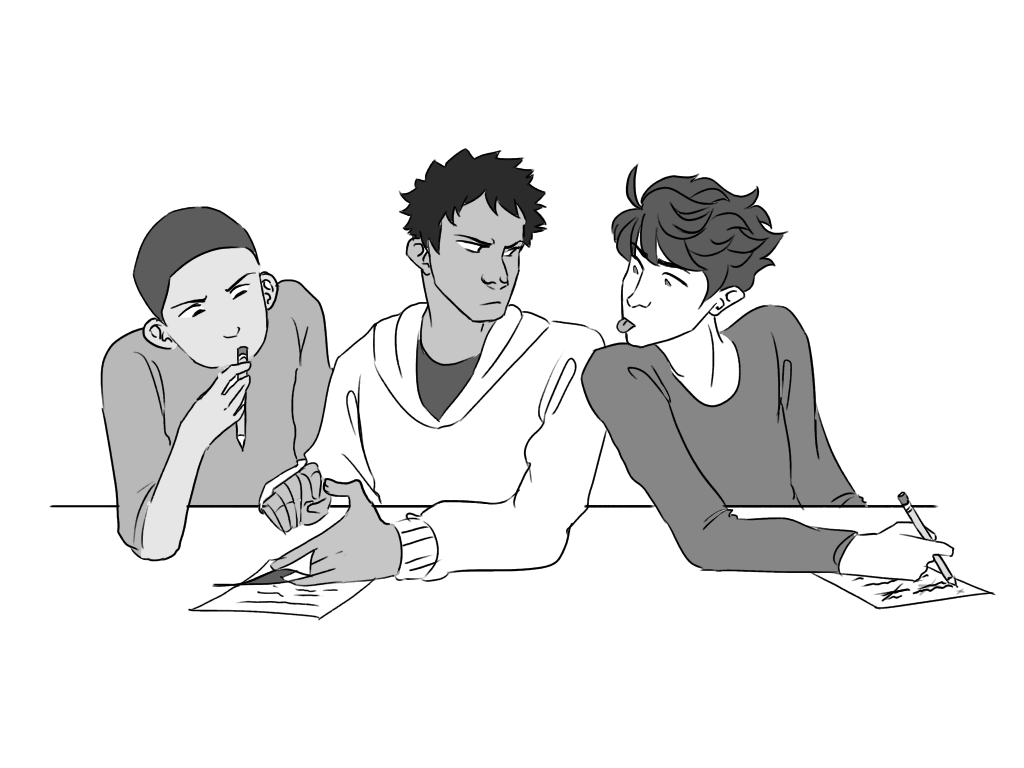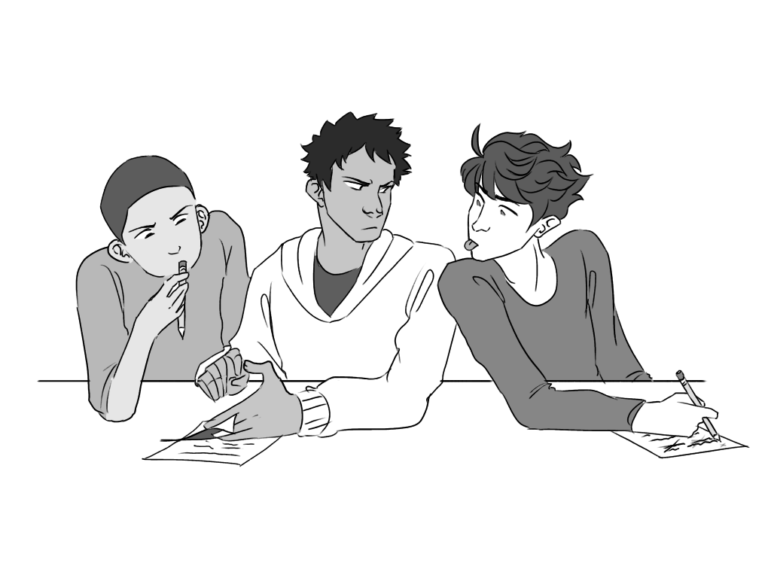
By Zack Cherkas, Victoria Fong, Ashley Tsang and Anders Zhou
It’s 2 a.m., and there’s an essay due tomorrow. I’ve only written the first paragraph. Should I sneak a peek at Alice’s essay for ideas? Everybody used the same quotes, right? Is that even considered cheating? I’m sure it’ll only come up as 2 percent similarity on Turnitin. They are just ideas anyways, and we discussed all of this in class. Nobody will know … and I don’t want to stay up all night.
THE CAUSE
Located between San Francisco and Silicon Valley, innovation and success prevails at Aragon, leading some students feeling pressured academically. “Going to school in Silicon Valley, amidst some of the nation’s top universities, puts extraordinary amounts of pressure on students to do well in school,” says junior Frank Liu.
Physics teacher Steve Ratto, observes cheating by younger students who take more rigorous classes. “More of the younger grades are taking harder classes and those are the kids that tend to [cheat],” Ratto explains.
At the same time, the Outlook sent out a survey to all students regarding cheating. Out of the 305 respondents, 235 students, or 77 percent, believe that their peers cheat due to an emphasis on getting good grades, rather than learning.
Junior Michael Wang agrees and feels this mentality in some of his peers in his AP English class. “I just care about understanding everything, being proud of my work and learning what I did wrong to improve,” he explains. “In the end, the grade came with that. There’s no way to force that, but people don’t realize that and those people are the ones that cheat.” Wang remembers one time where another student was scared for their grade after three weeks in the semester and said. “I have an 87 [percent in the class]. I’m hella scared.”
Although students and teachers disagree on where to root the causes of cheating, most can agree that it creates an uneven academic playing field.

THE METHOD
There are varying degrees of academic dishonesty. From copying someone’s homework to taking pictures of a final, students have witnessed many methods of cheating. Junior Diana Gong describes cheating in three levels. “Light-cheating would be like an assignment that’s less than five points that’s just some random worksheet that a teacher gives and it’s just filling in a few blanks or answering a few review questions,” she says.
According to the Outlook’s survey, 73 percent of all polled students copied someone else’s homework at least once while 14 percent reported that they copy others’ homework daily. Gong admits, “I myself have done it in the past, and a lot of times it’s because of time restraints and not because I’m being lazy.”
It’s Gong’s second level of academic dishonesty that carries serious weight: “[it’s] like cheating on a quiz,” says Gong, “or cheating on a unit test. But I think it’s really bad if you do it on an AP test or a final.”
Once, sophomore Madisyn Yoo took an Algebra 3-4 group test in freshman year and the other members of her group used a worksheet to help. “We had a group test on the unit circle,” Yoo says. “I remember the sophomore and junior at my table literally took out the worksheet that had the unit circle on it, and used it for part of the test.”
As a freshman, the incident left a big impression on Yoo. “I freaked out, but they kept telling me to calm down,” Yoo continues. “I was too afraid of them to do anything, so for the rest of the test that they were cheating on, I did my own work and put my test on top.”
A more severe instance of cheating took place when junior Barney* plagiarized his essay for Ms. Wei’s AP English class, where students write an essay on the book “Beloved.” He merely needed to do a quick
Google search to find a former student’s essay. When he submitted his essay to Turnitin, Barney had a 10 percent similarity rate, flagging his teacher’s attention.
Websites such as the one that Barney used encourage students to cheat since they openly display the work of other students.
The third level of cheating that Gong outlines occurs when students pay others to either help or simply finish their assignments for them. “It’s not an act of desperation because ‘Oh, you didn’t have time,’ or you accidentally fell asleep,” continues Gong. “That’s just a level of [laziness] and disrespect to your teachers and also a sign of arrogance, because you’re telling people that ‘Look, I can afford to pay someone hundreds of dollars to do something for me,’ whereas a lot of people wouldn’t be able to do that.”
It’s the third level of cheating where Gong delineates a clear lack of regard for Aragon’s learning environment. At that level, cheating can result in lasting consequences and severe repercussions.
WHISTLEBLOWING: Two students offer different views on bringing academic dishonesty to light.
ETHAN CHAO
In freshman year, Aragon alumnus Ethan Chao witnessed a student cheating on a Spanish test and told the teacher. “I saw someone taking out binder paper out of his shirt, looking at it,” Chao recalls, “and then stuffing it down his shirt, so I reported it. He, therefore, was caught.”
Two months after Chao reported the incident, the same student was caught using another student’s lab data. “After that, he started getting more academic dishonesties. I could see that after those first two, he just gave up on school,” says Chao.
Later, in senior year, when the student applied to college, he found that the consequences of cheating had a profound impact. Chao adds, “[The student] was eventually rejected by almost every school he applied to, despite great grades and test scores.”
Although Chao believed at the time he was right, he says, “I’ve felt bad ever since, knowing I destroyed someone’s life. What I did to him during his moment of desperation was unforgivable.”
Now, Chao has a more nuanced view of cheating, believing that many may do so out of desperation.
ANNABEL*
During her sophomore year, junior Annabel* knew several students who cheated during English tests. “I wanted to report [it] many times last year, but I didn’t have good chances to and I didn’t want to alienate myself,” writes Annabel in an email, “but I am glad everything has caught up to most of these people.”
Annabel had a lot of “pent up frustration” towards the situation and felt compelled to tell her current English teacher this year because the situation finally ran full circle and she wanted to provide evidence.
One student obtained the answers to English tests and would brag about not needing to study. “I believe [a student] bought answers somehow and it might be because [the teachers’] tests might not change over the years,” says Annabel. “The only other person I know that was involved was [another student], who is known for paying people for answers.”
As Annabel was hesitant to report the situation at first, she adds, “What angers me is that [the cheaters] think they’re right and they think they’re so clever and they get away with things, then they have the nerve to brag about it.”

THE EFFECT
Perhaps the most blatant result of cheating — an “F” on a quiz or a zero on the final — deters some people from outright copying their next door neighbor on a test. The implications of an act of academic dishonesty, however, holds a different sort of weight than what most students would believe.
While cheaters normally face immediate consequences, AP English teacher Jennifer Wei believes that there are also long term repercussions. “There’s that basic logic — if you cheat so that you can get into this or that college,” she explains, “then you’ve trapped yourself into that cycle if you’re going to a college that is sort of out of your reach or out of your ability.”
At the same time, science teacher Megan Thaler worries that cheating can become contagious. “If you have other people who are lazy, dishonest and are cheating and are getting the same grade as you,” says Thaler, “that can be extremely demoralizing and you lose all faith in your classmates and your friends. And that’s how other people who were really good and trying to be honest might [slip] into the hole. ‘Well if everybody’s doing it then I will too,’ and that’s very unfortunate.”
Last school year, students in Chemistry 1-2 took pictures of the final exam and distributed them to numerous other students in the class. As a result, there have been changes made to the testing procedure. “The entire Chemistry course had to be changed for the first time in, according to the science teachers, 10 years because of the massive scale of cheating that had taken place,” describes current Chemistry student junior Aaron Dasig Aguada. “Chemistry students now are not allowed to even use their own calculators on tests. For the first half of this year, students couldn’t even learn how to use balance equations with calculators until the school could pay for class sets of designated calculators.”
While cheating may either be a habitual routine or a result of depseration, students’ actions affect more than just themselves. It’s clear to see that both teachers and students face the repercussions of academic dishhonesty.
*Certain names were changed to protect the student’s privacy.
Correction — FEB. 9, 2017: A previous version of this article misstated that Mrs. Thaler had a one bad apple spoils the bunch mentality. She does not.




